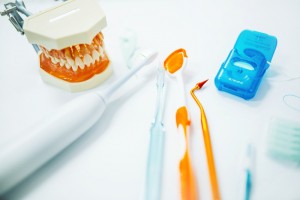Healthier Teeth with Diabetes and Chronic Conditions
November is American Diabetes Month, or a time to be more conscious of diabetes and how it can affect you. More than 100 million Americans have diabetes or prediabetes, which can both raise your risk for gingivitis and serious gum disease. This is because your mouth is more susceptible to bacterial infections with diabetes and less able to fight off infections, according to the American Diabetes Association. Learn how this chronic condition can lead to chronic problems with your oral health and ways to avoid those problems!
Chronic Conditions and You
There are countless chronic conditions that your body can have, and many depend on lifestyle choices such as eating, exercise, tobacco and alcohol use and more. Many people will have some type of chronic condition throughout their lives. In fact, tooth decay—or cavities is considered a chronic disease by the Centers for Disease Control and Prevention. The National Institutes of Health and other health organizations consider tooth decay to be the #1 chronic condition that affects both children and adults in the United States.
However, this is a disease that can be prevented and one that you can get rid of with the right oral care. Other chronic conditions can’t be eliminated as easily. One is diabetes, which stays with a person for life once they have it. This disease and others such as cancer, HIV/AIDS, osteoporosis and more can all affect the health of your teeth and gums. This is because both your teeth and gums have blood vessels that bring nutrients to them and nourish them. Many chronic conditions affect the blood or its circulation, as well as the nutrients that can reach your tissues.
You can also develop a chronic condition from what you are putting into your mouth, especially if you have a nutrient-poor diet. Obesity comes from your eating habits as well as genetics. Diabetes has a connection to high sugar intake as well as obesity. Osteoporosis is a lack of calcium and vitamin D in your bones. Your oral health really is a window to the rest of your health, especially if you don’t get the nutrients your body needs to keep it healthy.

Diabetes: What Is It?
November is National Diabetes Awareness Month. This is a chronic condition that can be especially damaging to your oral health and to all the tissues of your body. We’re focusing on this because it is so wide-spread and millions don’t even know they have it. Diabetes is the 7th leading cause of death and a main factor in oral health problems besides oral hygiene and high sugar intake.
When you eat, your body processes your sugars and carbs (which break down into sugars) for energy. Sugars enter your bloodstream, and hormone-regulated insulin helps take sugar out of your blood so your cells can use it. With diabetes, the body becomes insulin resistant and can’t take sugar out of your blood. The result is major health problems such as fainting, dizziness, vomiting, nausea, shaking, death and more. Your circulation is affected and tissues in various parts of the body don’t receive the blood and nutrients they need. People with diabetes are more susceptible to illnesses, take much longer to heal from wounds and can get infections easily.
An estimated 100 million Americans either have diabetes (about 30 million diagnosed), or are in pre-diabetic stages. You may have gingivitis, gum disease or tooth decay issues because of the effects of diabetes.

Diabetes and Your Oral Health
Patients with diabetes are shown to struggle with oral health issues much more frequently than patients without diabetes or with other chronic conditions. Your gums can become more sensitive to acidic plaque on the teeth, which is a combination of mouth bacteria mixing with sugars in your food. The gums can become swollen and inflamed easily, turning more red and bleeding often. Gum recession is common, which makes the gums pull away from the teeth and the teeth begin to fall out.
Patients can experience tooth decay easier because the mouth is less able to combat bacteria that would lead to plaque and dental decay. Diabetes causes dry mouth in a lot of it’s patients. You need your saliva to continually bathe your teeth with minerals from your foods. When acids and sugar strip minerals from your teeth, your saliva helps remineralize them. Your saliva also helps regulate the pH of your mouth, so it’s not constantly acidic, which damages teeth and gums. That dry mouth leads to other problems such as chronic bad breath. Tobacco and alcohol use makes these problems even worse. Their use—which leads to nerve damage—can be intensified by gum tissues that don’t receive enough nutrients from your blood.
Have Healthier Teeth All Throughout Life
The best way to avoid oral health problems with your chronic conditions is to take meticulous care of your teeth as well as your chronic conditions. Follow the diet regimen you need to stay healthy. Limit your sugar intake no matter what condition you have, but especially with diabetes as high sugar intake is linked to diabetes. Keep your mouth clean through proper brushing and flossing each day.
The recommendation by the American Dental Association is that you brush your teeth at least twice a day for two minutes at a time. Do this even more often with diabetes. Floss 1-2 times, getting up into the gum line and scraping your teeth. Use mouthwash to kill bacteria that would cause worsening oral health conditions and use fluoride products to protect your teeth from decay. With any chronic condition, make sure you are seeing a dentist more than the prescribed twice-a-year recommendation for exams and dental cleanings. This can ensure you keep your smile healthy no matter what is going on with your health. To schedule your comprehensive exam, call Dr. Evanson’s office today at (720) 409-0008!
Leave a reply →







